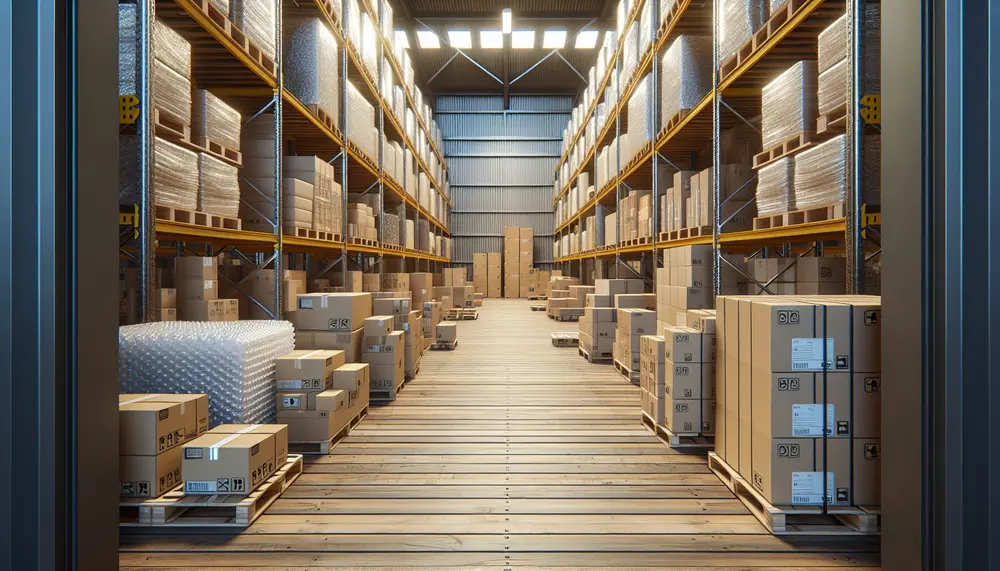Table of Contents:
Understanding the Role of a Supply Chain Packaging Company
When contemplating the expansion or optimization of your packaging process, it becomes essential to grasp what a supply chain packaging company contributes to your business. Simply put, these companies are specialized entities that focus on delivering effective packaging services that integrate seamlessly into your overarching supply chain management efforts. They provide a suite of services encompassing the design, production, and delivery of packaging materials, often tailored to specific industry needs.
A supply chain packaging company works closely with clients to ensure that the packaging not only protects products during transit but also aligns with branding efforts, regulatory requirements, and cost objectives. By doing so, they play a pivotal role in how products are received by customers and the impression they leave on the end consumer. This aspect of the supply chain is critical as it directly impacts customer satisfaction and, ultimately, your company's reputation.
Moreover, the right packaging partner brings innovation and expertise to the table, which can result in improved durability, recyclability, or even smarter packaging that interacts with consumers. Their role extends beyond mere box suppliers; they are consultants and solution providers that address complex packaging challenges. The role of a supply chain packaging company is constantly evolving to meet the dynamic demands of global trade and consumer expectations, emphasizing their increasing importance in a brand's success.
Key Factors to Consider When Selecting a Packaging Partner
When you're in the market for a supply chain packaging company, certain key factors must guide your choice to ensure you establish a beneficial partnership. Not every company will meet your specific needs, so careful consideration is imperative for a successful collaboration.
- Industry Experience: Look for a packaging partner with a proven track record in your specific industry. Extensive experience often translates into a deeper understanding of industry-specific challenges and regulations.
- Quality Assurance: An ideal partner should have strict quality control processes in place, guaranteeing that the packaging meets all necessary standards and criteria.
- Scalability: As your business grows, so will your packaging needs. The right partner will be able to scale up operations and output to match your growth trajectory without compromising on quality or timeline.
- Material Sourcing: Investigate their sourcing practices. Your partner should be able to source high-quality materials reliably and ethically, ensuring your packaging is both durable and socially responsible.
- Innovative Capabilities: Look for a partner that stays at the forefront of packaging innovation, utilizing the latest technologies and approaches to keep your packaging modern and functional.
- Financial Stability: Ensure your partner has a solid financial foundation. A stable company will be a reliable part of your supply chain for years to come.
- Customer Service: Excellent customer service is non-negotiable. A partner with a responsive, solution-oriented customer service team can make all the difference in managing your packaging needs.
These factors are essential in aligning with a supply chain packaging company that will not only meet your current requirements but will also support your long-term business goals.
Pros and Cons of Selecting a Packaging Supply Chain Partner
| Pros | Cons |
|---|---|
| Expertise in packaging solutions | Potential for higher costs |
| Access to a broader range of materials | Less control over the supply chain |
| Ability to scale operations up or down | Dependency on partner's reliability |
| Benefit from partner's established network | Risks associated with partner's business stability |
| Improved lead times and efficiency | Communication challenges |
Evaluating the Expertise of Potential Packaging Partners
Selecting a supply chain packaging company with the right know-how is pivotal to your product's success. Evaluating the expertise of your potential packaging partner is more than reviewing a list of past clients or successful projects—it's about understanding their depth of knowledge and ability to navigate the complexities of packaging in your sector.
Before forging a new partnership, consider the following aspects of the company's expertise:
- Technical Proficiency: Assess their understanding of different materials, production processes, and packaging technologies. They should be well-versed in the technicalities that can affect packaging integrity and functionality.
- Design and Branding Insight: Your packaging partner should excel at creating designs that not only protect your product but also resonate with your brand identity and appeal to your customers.
- Compliance Knowledge: Make sure they are knowledgeable about the compliance and regulatory standards that govern packaging in your industry to avoid potential legal issues.
- Problem-Solving Skills: A competent partner will demonstrate a strong track record in overcoming packaging challenges and developing innovative solutions that address unique problems.
The combined expertise of your chosen supply chain packaging company will not only streamline your packaging operations but also provide a strategic advantage in the marketplace.
The Importance of Technology and Innovation in Packaging Solutions
In a rapidly advancing business landscape, the role of technology and innovation in packaging solutions is crucial for maintaining a competitive edge. A supply chain packaging company that invests in cutting-edge technology ensures that your products are packaged with efficiency, precision, and sustainability in mind.
Tech-driven packaging solutions offer various benefits:
- Enhanced Automation: Automation can drastically improve the speed and reliability of the packaging process, leading to increased productivity and reduced labor costs.
- Advanced Materials: Innovative materials can lead to stronger, lighter, and more eco-friendly packaging, ultimately resulting in cost savings and lower environmental impact.
- Smart Packaging: The integration of smart technologies, such as QR codes, RFID tags, and IoT devices, provides added value through tracking, interactive consumer engagement, and data collection.
- Customization Capabilities: State-of-the-art machinery allows for high customization levels, which means packaging can be easily tailored to fit individual product needs or brand specifications.
- Testing and Prototyping: Modern techniques enable rapid prototyping and testing, facilitating better design decisions and faster market entry.
The embrace of technology and innovation by your packaging partner is not merely a perk; it is a critical factor that can drive the success of your product's packaging and, by extension, your product itself.
Assessing the Sustainability Practices of Supply Chain Packaging Companies
Sustainability is an increasingly important consideration in today’s market. Consumers and businesses alike are becoming more environmentally conscious, which means the sustainability practices of your supply chain packaging company are more crucial than ever.
To assess your potential partner's commitment to sustainability, focus on the following areas:
- Material Use: Evaluate their use of recycled or biodegradable materials. A dedication to using eco-friendly materials minimizes environmental impact and can also resonate positively with customers.
- Waste Reduction Strategies: Consider how the company minimizes waste throughout their operations. This can include reduction initiatives during the manufacturing process as well as in their supply chain.
- Energy Efficiency: Look into the partner's energy policies and practices. Companies that implement energy-saving technologies and renewable energy sources in their facilities show a proactive approach to reducing carbon footprints.
- Certifications and Standards: Check for relevant sustainability certifications, which indicate that the company adheres to recognized standards of environmental performance, such as ISO 14001 or similar.
In integrating a focus on sustainability within your packaging strategy, not only do you help protect the planet, but you also position your brand to meet the expectations of a growing demographic of eco-aware consumers and businesses.
Cost-Effectiveness and Value in Packaging Partnerships
A successful partnership with a supply chain packaging company should not only meet operational and sustainability standards but also offer cost-effectiveness and value. It's essential to evaluate how a potential partner can help optimize expenses without sacrificing the quality and integrity of your product packaging.
Here are some ways a packaging partner may deliver cost-effective solutions:
- Bulk Purchasing and Economies of Scale: The ability to purchase materials in bulk and benefit from economies of scale can reduce overall packaging costs significantly.
- Efficient Design: Intelligent design can reduce the amount of material used and lower shipping costs by optimizing space, leading to savings throughout the supply chain.
- Streamlined Processes: By streamlining the design and production processes, a packaging partner can minimize turnaround times and reduce overhead, passing on the savings to you.
- Long-term Cost Savings: Investing in quality and durable packaging solutions upfront can result in long-term cost savings by minimizing damages and returns.
Understanding how a packaging partner approaches cost while incorporating value-add services is essential. The objective should be to strike the right balance between affordability, quality, and service, ensuring that the chosen packaging solutions propel your business forward in a cost-efficient manner.
Navigating Logistics and Distribution with Your Packaging Partner
The logistics and distribution phase is where the efficacy of your packaging really gets put to the test. Partnering with a supply chain packaging company that provides robust support in this area is critical to ensuring that your products arrive at their destination in top condition.
Effective coordination with your packaging partner in logistics involves:
- Transportation Compatibility: Ensuring that packaging designs are compatible with your preferred modes of transportation, potentially reducing costs and transit times.
- Protective Packaging: Guaranteeing that products are adequately protected throughout the distribution process, thereby reducing the incidence of damage or loss.
- Inventory Management: Collaborating on packaging inventory levels to prevent bottlenecks or excesses that could disrupt the supply chain.
- Regulatory Compliance: Navigating international shipping regulations and ensuring that packaging meets all legal requirements for cross-border distribution.
Your packaging partner's logistical expertise can significantly enhance your supply chain efficiency, providing peace of mind that products are delivered safely and on time.
Building a Long-Term Relationship with Your Supply Chain Packaging Company
A productive partnership with a supply chain packaging company is not just about meeting immediate needs; it's about establishing a long-term relationship that can grow and evolve with your business.
To foster a fruitful, enduring relationship with your packaging partner, consider these elements:
- Communication: Open and ongoing communication is the foundation of any strong partnership. Regular updates and transparent dialogue can help pre-empt challenges and align goals.
- Shared Vision: Aligning your business objectives with the capabilities of your packaging partner ensures that both parties are working towards common goals and milestones.
- Continuous Improvement: Engage in a partnership that values continuous improvement and innovation, allowing both your product and packaging to adapt to changing market demands.
- Trust and Reliability: Establish trust through consistent delivery on promises and reliability in performance. These attributes will solidify the partnership.
- Collaborative Strategy: Work together to develop strategic initiatives that can drive competitive advantages for both your organization and your packaging partner.
By focusing on these relational dynamics, you pave the way for a mutually beneficial partnership that not only meets the current landscape but also anticipates future developments in packaging needs.
Case Studies: Success Stories of Effective Packaging Partnerships
Learning from case studies offers valuable insights into the rewards of choosing the right supply chain packaging company. These success stories highlight specific examples where effective partnerships have led to significant benefits for businesses.
One such success story might involve a company that faced challenges with product damages during shipping. By partnering with a packaging provider that specialized in high-strength materials and innovative design, the company could reduce its damage rates, leading to fewer returns and increased customer satisfaction.
Another example could be a company that needed to speed up its time-to-market. An adept packaging partner helped them streamline their design and prototyping process through advanced 3D printing technology, allowing them to launch products faster and gain an edge over competitors.
Additionally, a brand committed to sustainability may partner with a packaging company that sources materials from certified sustainable operations. This partnership not only improved the brand's environmental footprint but also enhanced its reputation among eco-conscious consumers.
These case studies serve as proof that when a business finds a packaging partner whose expertise, values, and capabilities align with its own, they can achieve excellent results, such as cost savings, improved market presence, or superior product integrity.
Conclusion: Making an Informed Decision for Your Packaging Needs
In conclusion, selecting the ideal supply chain packaging company is a multifaceted decision that requires careful consideration. It is critical to weigh the various factors discussed, from their expertise and their approach to innovation and technology, to the value and cost-effectiveness they provide, not forgetting the significance of their sustainability practices.
By diligently evaluating these aspects, you can ensure that the partnership you establish will effectively support and enhance your logistical operations, meet your environmental goals, and provide the necessary flexibility and resilience to grow with your business.
Ultimately, the goal is to make an informed decision that aligns with your company's standards and ambitions, fostering a long-lasting relationship that contributes to your ongoing success in the market. This strategic partnership should not only solve current needs but also anticipate future industry trends and consumer demands, keeping your company at the forefront of packaging innovation.
Top 5 FAQ on Selecting an Ideal Packaging Supply Chain Partner
What are the key factors to consider when choosing a packaging partner?
It’s important to evaluate industry experience, quality assurance processes, scalability, material sourcing policies, innovation capabilities, financial stability, and customer service excellence when selecting a supply chain packaging company.
How does technical proficiency impact the choice of a packaging supply chain partner?
A company with strong technical proficiency can better understand the nuances of materials, production processes, and technology, which affects the integrity and functionality of packaging, ensuring your products are well-protected and presented.
Why is sustainability an important aspect when choosing a packaging partner?
A focus on sustainability reflects commitments to environmental responsibility, and it can enhance brand reputation among consumers. It involves the use of eco-friendly materials, waste reduction strategies, energy-efficient practices, and adherence to environmental standards.
How can innovation and technology in packaging add value to my products?
Innovation and technology can lead to better packaging solutions by improving automation, introducing advanced materials, enabling smart packaging features, allowing for customization, and facilitating rapid prototyping and testing.
What is the importance of financial stability in a supply chain packaging partner?
A financially stable partner ensures long-term dependability and can continuously support your business’s growth. It indicates the company is likely to remain a reliable part of your supply chain, avoiding disruptions in your operations.






